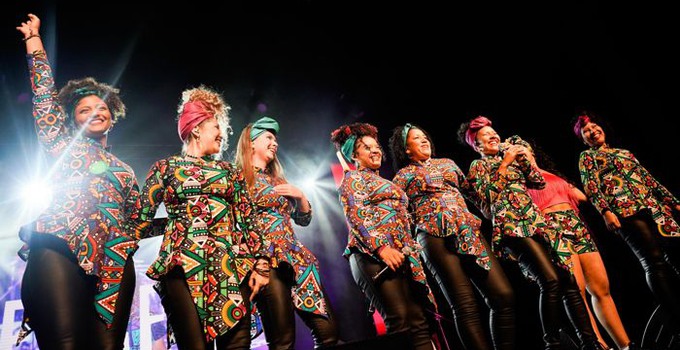
Enkelé is an all-women music group from Colombia, composed of seven members who advocates for feminism through traditional oral music. Photo: Andrés Piscov
Art as a tool for transitional justice
An article recently published i Security Dialogue advocates for viewing the arts as a vital tool in understanding transitional justice as a sociocultural project that centers the everyday experience of people affected by violence. It suggests that embracing the power of music and dance can lead to a more inclusive approach to gender justice and security in war-affected settings.
In the article ‘Singing truth to power: Transformative (gender) justice, musical spatialities and creative performance in periods of transition from violence’, researchers at the Swedish Defence University, Ghent University and Fundación Lüvo examine the role of embodied performances in addressing oppressive structures in post-peace agreement Colombia, focusing on the convergence of music and gender justice.
“Artistic expressions, particularly through music and choreography, are utilized not only to denounce injustice but also as healing mechanisms for those affected by violence”, says Priscyll Anctil Avoine, Associate Senior Lecturer at the Department of War Studies, Swedish Defence University.
Art as a facilitator for peaceful transitions
The article argues for greater attention to these artistic processes as they provide significant insights into political interventions and the possibilities for peaceful transitions globally.
“Art is seen not just as a response to past injustices, but as a proactive force that challenges the patriarchal and racist underpinnings of Colombian society”, says Priscyll Anctil Avoine.
The findings contribute to the study of transitional justice and the arts by framing transitional justice as a sociocultural project that emphasizes how individuals and communities transform their lives in the aftermath of violence.
Case study of a women’s music collective
The article highlights the case of the women's music collective Enkelé, which has faced backlash from conservative groups for its public denunciation of ongoing violence. Enkelé is an all-women music group from Colombia, composed of seven members who advocates for feminism through traditional oral music.
The study argues that musical performances can open political spaces for societal transformation, going beyond conventional transitional justice mechanisms to include cultural and structural changes. Furthermore, it stresses the importance of analyzing the entire lifecycle of musical performances, from their creation to the stage, as they are potent forms of contestation.
Researching feminist and decolonial practices
“By focusing on Enkelé’s song ‘Tierra,’ we illustrate how indigenous and Afro Colombian perspectives are sidelined in formal justice processes in Colombia. We also discuss how performances create aesthetic and political spaces where diverse expressions of identity and resistance can intersect, bringing marginalized voices to the forefront”, says Priscyll Anctil Avoine.
The article is based on feminist academic-artistic-activist research conducted with Enkelé since 2020.
“We have chosen this approach since the project was born out of our own activism in researching feminist and decolonial practices. It integrates the arts and music into the study of armed conflict and war and proposes an innovative approach to a specific war-affected region of Colombia”, says Priscyll Anctil Avoine.
Publication
María Martín de Almagro (Ghent University), Anctil Avoine, Priscyll (Swedish Defence University), and Yira Miranda Montero (Fundación Lüvo & Enkelé): Singing truth to power: Transformative (gender) justice, musical spatialities and creative performance in periods of transition from violence, Security Dialogue.
More about
War StudiesPage information
- Published:
- 2024-04-22
- Last updated:
- 2024-04-22
